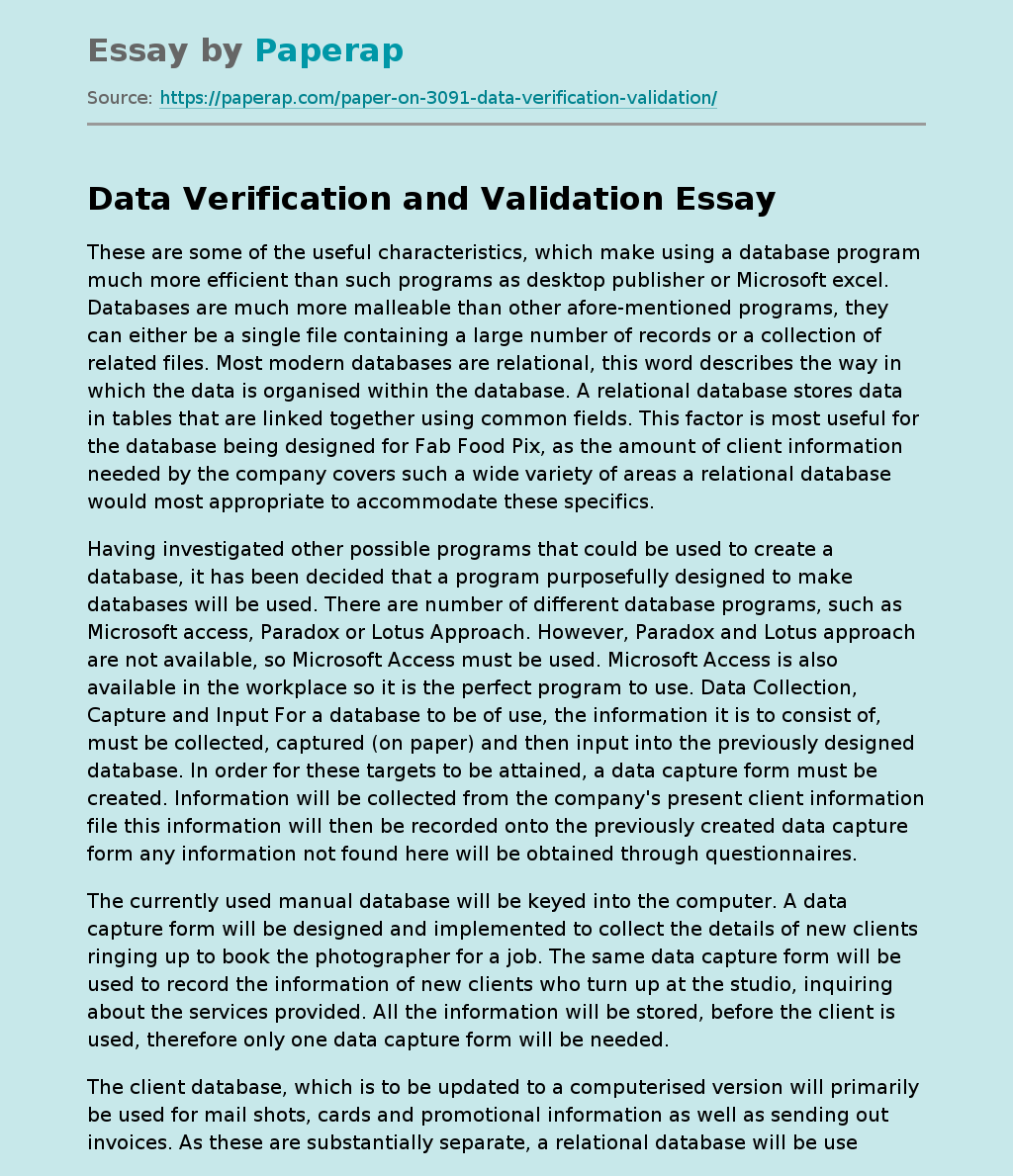Data Verification and Validation
These are some of the useful characteristics, which make using a database program much more efficient than such programs as desktop publisher or Microsoft excel. Databases are much more malleable than other afore-mentioned programs, they can either be a single file containing a large number of records or a collection of related files. Most modern databases are relational, this word describes the way in which the data is organised within the database. A relational database stores data in tables that are linked together using common fields.
This factor is most useful for the database being designed for Fab Food Pix, as the amount of client information needed by the company covers such a wide variety of areas a relational database would most appropriate to accommodate these specifics.
Having investigated other possible programs that could be used to create a database, it has been decided that a program purposefully designed to make databases will be used. There are number of different database programs, such as Microsoft access, Paradox or Lotus Approach.
However, Paradox and Lotus approach are not available, so Microsoft Access must be used. Microsoft Access is also available in the workplace so it is the perfect program to use. Data Collection, Capture and Input For a database to be of use, the information it is to consist of, must be collected, captured (on paper) and then input into the previously designed database. In order for these targets to be attained, a data capture form must be created. Information will be collected from the company’s present client information file this information will then be recorded onto the previously created data capture form any information not found here will be obtained through questionnaires.
The currently used manual database will be keyed into the computer. A data capture form will be designed and implemented to collect the details of new clients ringing up to book the photographer for a job. The same data capture form will be used to record the information of new clients who turn up at the studio, inquiring about the services provided. All the information will be stored, before the client is used, therefore only one data capture form will be needed.
The client database, which is to be updated to a computerised version will primarily be used for mail shots, cards and promotional information as well as sending out invoices. As these are substantially separate, a relational database will be used, so that when an invoice is being composed, the name, company, position and address of the client can be displayed after searching for the specific job and it’s costs. The first table in the database will contain information for producing mail shots. There are not many different forms of verification, proof reading, where once the document has been typed out, it is read by a proof reader who points out or highlights any mistakes. However, this is not very reliable as, there is always a possibility that the proof reader will not pick up every single mistake grammatical or spelling.
The other form of verification is double entry. This is when two people write out the specified information on two different computers. The computers then match up the two sets of correct data. If not all the information is matched up, mistakes are present. It is unlikely that each person will make no mistakes, or make the same mistakes. It is likely that where one person has made a mistake, someone else will not have. The document (if found to be containing mistakes) must then be proof read to find the mistakes and the sources of the information must be used to then correct the document.
It is most beneficial to have a validation rule on the database, to check for any errors. Validation rules can be made for the majority or fields. Fields such as Raw Total, VAT and Total cannot have validation rules, as there is the possibility that every single entry in this field may be different. Due to the type of data entered into my relational database, validation rules are not often appropriate. For instance in such a field as Client Name and Company Name a validation rule could not be used as it is not possible to know all clients and company’s which were to be entered into the database as this is occasionally updated.
However, a validation rule was made for fields such as Client ID, Job Dates, Dates of Re-Shoots, Date of Payment the validation rules of majority is ‘Date/Time’ the format must then be set to the specific type of date. The date can be ‘General Date’, 05/09/99 17:32:44, ‘Long Date’, 28 December 1987, ‘Medium Date’, 28-Dec-87, ‘Short Date’, 28/12/87, ‘Long Time’, such as; 17:32:44, ‘Medium Time’, 05:32, or ‘Sort Time’, 17:32. The validation rule for the Client ID field is ‘Auto Number’, this means the computer will automatically fill in this field with a unique number, there will only be one each number. This rule prevents a Client ID number from being entered more than once. Other fields have been set, so that unless information is entered, the user is not able to progress any further.
Relating the Database In order to relate the two tables effectively, the primary key field ‘Client ID’, in the Client Details table was made an automatic number (i.e. all the numbers included in this field were unique.) this primary key field was used as a foreign key in the Job Details table, which was not an automatic number, as a client could have numerous jobs with the same photographer. Therefore, I created another key Job Dates, this key along with the Client ID key made each record unique.
Data Verification and Validation. (2017, Aug 03). Retrieved from https://paperap.com/paper-on-3091-data-verification-validation/

